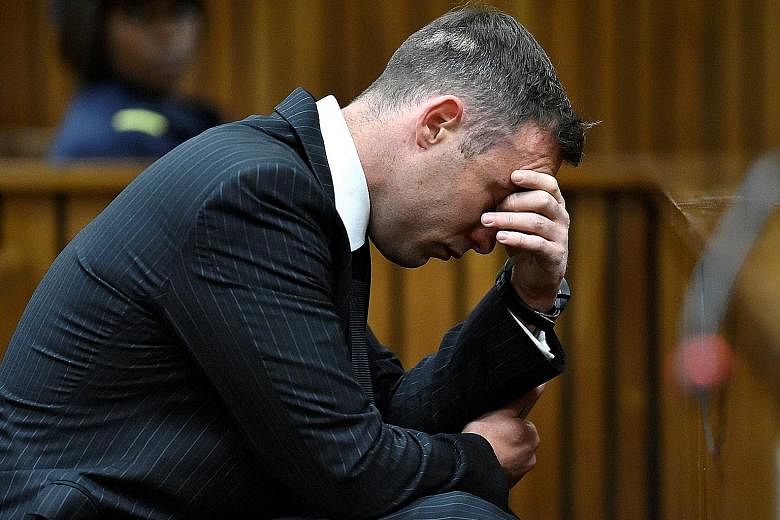PRETORIA • Oscar Pistorius has shown no remorse for the murder of his girlfriend, Ms Reeva Steenkamp, a prosecutor told a court yesterday, while a psychologist described him as "a broken man" who should not be jailed.
The 29-year-old Paralympic gold medallist, known as Blade Runner for the carbon-fibre prosthetics he used to wear when racing, faces a minimum 15-year jail term after his original manslaughter conviction for the 2013 killing was upgraded.
The case has prompted a fierce debate in a country beset by high levels of violent crime. Some rights groups have said the white athlete has received preferential treatment.
Professor Jonathan Scholtz, a psychologist called by Pistorius' lawyer, Mr Barry Roux, told the sentencing hearing that the athlete - who attended the hearing in a dark suit and at times sat with his head in his hands - was on medication for depression, anxiety and insomnia.
"One would describe him as broken. In my opinion, his current condition warrants hospitalisation," said Prof Scholtz. "Since 2013, he becomes traumatised when he hears the sound of gunfire... He never wants to touch a firearm again."
Prosecutor Gerrie Nel questioned Prof Scholtz's assertion that Pistorius was not fit to testify, saying the athlete had given a TV interview. The hour-long interview with Britain's ITV is due to air this month, local media have reported.
Mr Nel told the court that Pistorius has shown no remorse for the murder, and that he only "feels sorry for himself".
Pistorius had temper tantrums and, while serving his sentence, once banged a table when he got upset with a nurse, Mr Nel added.
Spokesman for the National Prosecuting Authority Luvuyo Mfaku said its position was "to argue for the prescribed sentence to be imposed, that is, 15 years".
Prof Scholtz said Pistorius was once assaulted while in jail, but Mr Nel rejected this, saying the complaint register in which Pistorius often raised issues had no report of such an incident.
Mr Nel also disputed a claim by the psychologist that Pistorius was traumatised after he saw a prisoner who had hanged himself, saying it was unlikely he could have seen the victim.
Pistorius initially received a five- year sentence for culpable homicide, South Africa's equivalent of manslaughter, for shooting Ms Steenkamp through a locked toilet door in his Pretoria home. He had argued he mistook her for an intruder.
The conviction was later upgraded to murder after an appeal heard by the Supreme Court, which ruled in March that he had exhausted all his legal options and could no longer appeal.
Original trial judge Thokozile Masipa started hearing the pre-sentencing arguments at Pretoria High Court yesterday.
State prosecutors who lodged the appeal said Pistorius intended to kill Ms Steenkamp and that the law graduate and model had fled to the toilet during an argument. A final ruling on Pistorius' sentence is expected by the end of this week.
Prof Scholtz told the hearing, which was attended by Ms Steen- kamp's mother, that Pistorius had suffered financially and found asking others for assistance humiliating.
Pistorius lost millions of dollars in endorsements and sponsorships after reaching the pinnacle of his fame in London 2012 when he became the first double amputee to run in the Olympics, reaching the 400m semi-finals.
REUTERS



